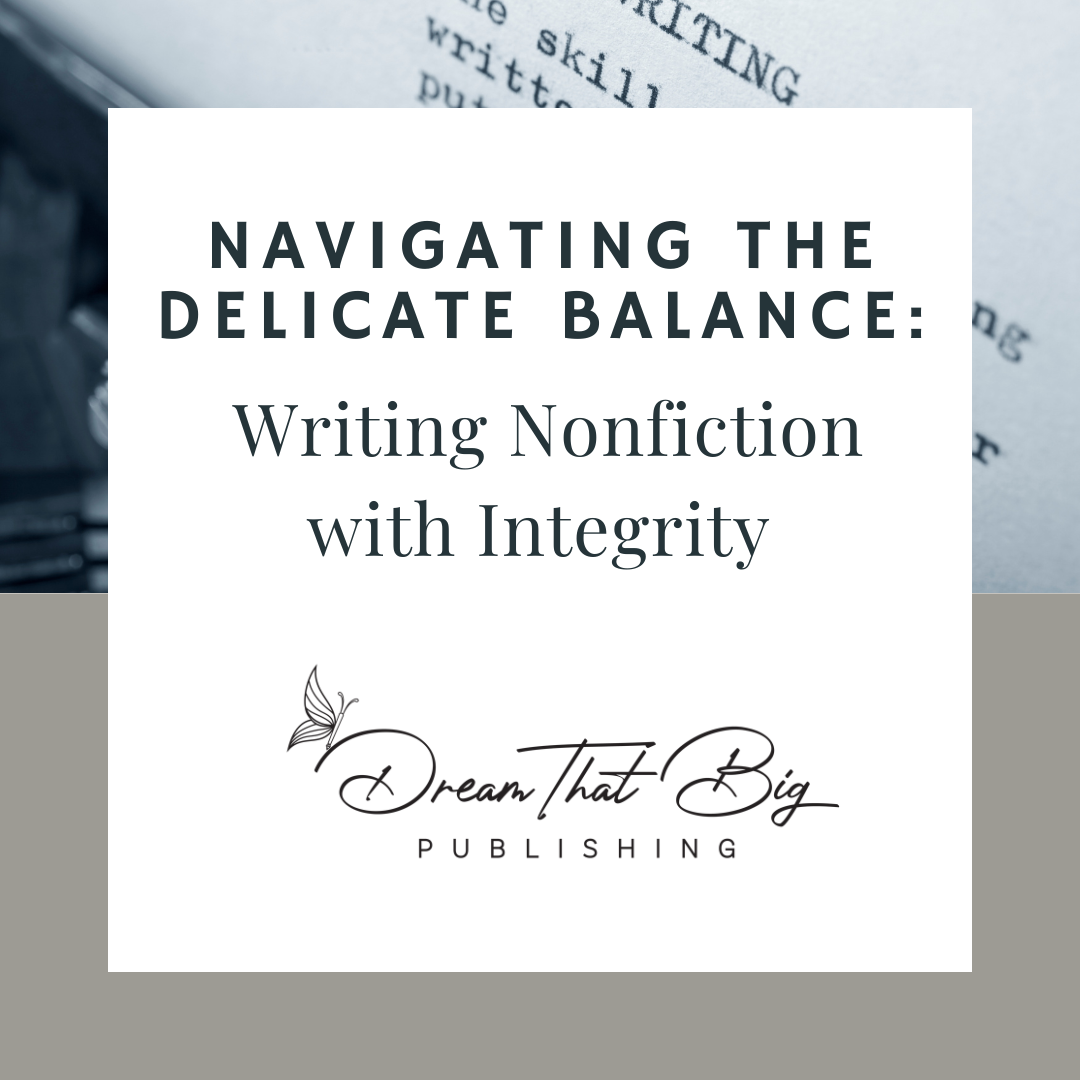Writing nonfiction can be a deeply personal and challenging endeavor, especially when it involves sharing the intimate details of our lives. Authors often find themselves torn between conveying their personal truths and delivering a message with purpose and meaning. In this blog post, we will delve into the profound struggle that authors face when sharing personal details about their lives while upholding integrity. We will explore the emotional and ethical dimensions of this journey, and by the end of this guide, you’ll have a clearer understanding of how to navigate the delicate balance between personal authenticity and meaningful storytelling.
There are five struggles that most authors sharing personal stories face:
- The Weight of Personal Disclosure: The first hurdle authors encounter when sharing personal details is the overwhelming weight of disclosure. It’s not just about revealing facts; it’s about exposing vulnerabilities, traumas, and moments of intense emotions. This disclosure can be a heavy burden to carry, as it requires authors to revisit painful experiences and confront their own truths.
- The Fear of Judgment: One of the most significant struggles in sharing personal details is the fear of judgment. Authors fear how their revelations will be received by readers, friends, and family. The constant question looms: Will they be perceived differently? Will they be misunderstood, criticized, or even ostracized? This fear can paralyze authors, making them hesitant to share their most personal stories.
- The Ethical Dilemma: Nonfiction authors must grapple with an ethical dilemma: how much is too much to share? Balancing personal authenticity with the responsibility to protect privacy, particularly that of loved ones, can be agonizing. This struggle often leads to painstaking decisions about what to include, what to omit, and how to mask identities without compromising the narrative.
- Maintaining Objectivity: In the pursuit of integrity, authors must strive to maintain objectivity. This can be challenging when writing about deeply personal experiences, as emotions often cloud judgment. The struggle lies in presenting a balanced perspective without letting personal bias overwhelm the narrative.
- Crafting a Meaningful Message: While authors may be tempted to include every personal detail, it’s crucial to remember the ultimate purpose of nonfiction writing: to convey a message with meaning and purpose. Striking a balance between personal authenticity and the core message of the work requires careful crafting and a willingness to prioritize the story’s greater significance.
Can you relate to any of the challenges mentioned above? If your answer is yes, rest assured that you are not alone in facing these significant internal conflicts as a nonfiction author. Drawing from my experience as both a writer and publisher, I have crafted nine simple strategies for navigating the delicate balance of writing nonfiction with integrity.
9 – Strategies for Writing with Integrity
Self-Reflection:
- Before embarking on the writing journey, take time for self-reflection. Understand your motivations, fears, and boundaries. This self-awareness will guide your decisions throughout the writing process.
- Example: Before starting my memoir, I spent time reflecting on my reasons for writing it. I realized that I wanted to share my experiences to inspire others and promote understanding, rather than seeking revenge or airing grievances. This self-reflection helped me stay true to my intentions throughout the writing process.
Open Communication:
- If your work involves sensitive or potentially harmful disclosures about others, consider open communication with those involved. Seek their consent or input, if possible, to maintain trust and integrity.
- Example: While writing my investigative journalism piece on a controversial topic, I reached out to the subjects I was covering. I conducted interviews and discussed my intentions openly, allowing them to share their perspective and concerns. This open communication built trust and ensured a more balanced and ethical representation of the issue in my work.
Narrative Distance:
- Use narrative techniques to create distance from your personal experiences, allowing you to present them objectively. This can help readers connect with your story without being overwhelmed by your emotions.
- Example: When recounting a traumatic event from my childhood in my personal essay, I employed narrative distance. Instead of diving into the raw emotions, I used third-person narration and vivid descriptions to allow readers to empathize with the experience without feeling overwhelmed by my emotions.
Ethical Redlines:
- Define your ethical red lines. Determine what you are comfortable sharing and what must remain private, protecting both yourself and those close to you.
- Example: As I began writing my family history, I established my ethical red lines. I decided not to disclose certain sensitive family secrets that could harm my relatives’ privacy. This allowed me to maintain a balance between sharing our history and respecting their boundaries.
Know Why You Are Sharing:
- Clarification and Purpose: Before putting pen to paper or fingers to the keyboard, take some time to clarify why you want to share your nonfiction story. Is it to heal, educate, inspire, or simply connect with others who may have similar experiences? Understanding your motivation will help you stay focused and genuine in your writing.
- Example: Suppose you’re writing about a challenging period in your life when you overcame addiction. Your motivation might be to offer hope and guidance to others who are struggling. By keeping this purpose in mind, your narrative can remain genuine and meaningful.
Understanding Your Audience and Intent:
- Audience-Centric Approach: Know your target audience and tailor your writing to their needs, interests, and emotions. Consider what your readers hope to gain from your story and how you can best serve them.
- Intent Clarity: Be clear about the message or takeaway you want to convey. Whether it’s resilience, self-discovery, or empathy, your intent should guide the way you frame your narrative.
- Example: If your intended audience is young adults dealing with mental health issues, your approach would differ from writing for a group of professionals interested in addiction recovery. Your intent in the former might be to provide relatable stories and coping strategies, while in the latter, you might focus on evidence-based treatments.
Decide What Part of Your Journey to Share:
- Selective Transparency: Not every detail of your personal journey needs to be included in your narrative. Choose the moments and experiences that best serve your purpose and resonate with your audience.
- Protecting Privacy: Be mindful of the privacy and consent of individuals mentioned in your story, especially if they played a significant role in your experiences.
- Example: If you’re writing about a difficult divorce, you might choose to focus on specific challenges you faced and the emotional growth that resulted from the experience, rather than airing every personal detail.
Focus on Bringing Value:
- Educate and Inspire: Use your personal experiences as a vehicle to educate and inspire your readers. Offer insights, lessons learned, and actionable takeaways that can benefit them.
- Authenticity: Authenticity is key to creating value. Share your emotions, vulnerabilities, and the unvarnished truth, but do so in a way that empowers and uplifts.
- Example: If you’re writing about your journey to financial stability after bankruptcy, provide practical advice, resources, and emotional support for readers facing similar challenges.
Invite Others to Hold You Accountable:
- Beta Readers and Editors: Share your manuscript with trusted beta readers or editors who can provide honest feedback. They can help you gauge the authenticity and impact of your narrative.
- Accountability Partners: Seek out accountability partners who can support you in staying true to your purpose and maintaining integrity in your storytelling.
- Example: If you’re concerned about the balance between authenticity and impact in your addiction recovery story, an accountability partner can provide valuable perspectives and ensure your message remains clear and impactful.
Writing nonfiction with integrity and a pure heart is an arduous journey filled with emotional and ethical dilemmas. The struggle to share personal details about one’s life while upholding the highest ethical standards is a test of an author’s character and dedication to the craft. By embracing self-awareness, open communication, and the art of narrative, authors can navigate this delicate balance, ultimately creating works that resonate with readers while preserving their own integrity and the trust of those they write about.
The other good news is that you don’t have to be alone on this book-writing journey. Dream That Big Publishing can help you in every stage of the writing and publishing process. Contact us today to find out more. We also host monthly events both in person and virtually, and we have a Facebook community to provide you with support when you get stuck. The resources are limitless with Dream That Big!
About Dream That Big Publishing:
At Dream That Big Publishing, we offer a variety of writing and publishing services that will help you every step of the way on your self-publishing journey. Sign up to work one-on-one with a writing coach, read our blog, and listen to our podcasts. We want to empower you to write the book you’ve always dreamed of sharing with the world. Join us for networking and empowerment events that are designed to help you prosper as an author and entrepreneur, aka “authorpreneur.” We also have publishing packages that offer everything you will need, from editing to formatting to marketing your book, so you don’t have to do it all yourself!
Dream That Big published authors keep 100% of their royalties have a book they are proud of, and have joined a nurturing community that is invested in their success. If you feel that our complete nurturing system is the right fit for your authorpreneur journey, please click here to get started!
-Octoryia Robinson
Facebook
Twitter
LinkedIn

